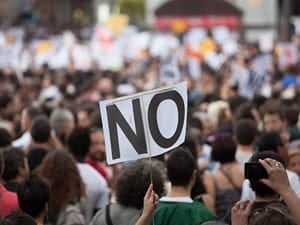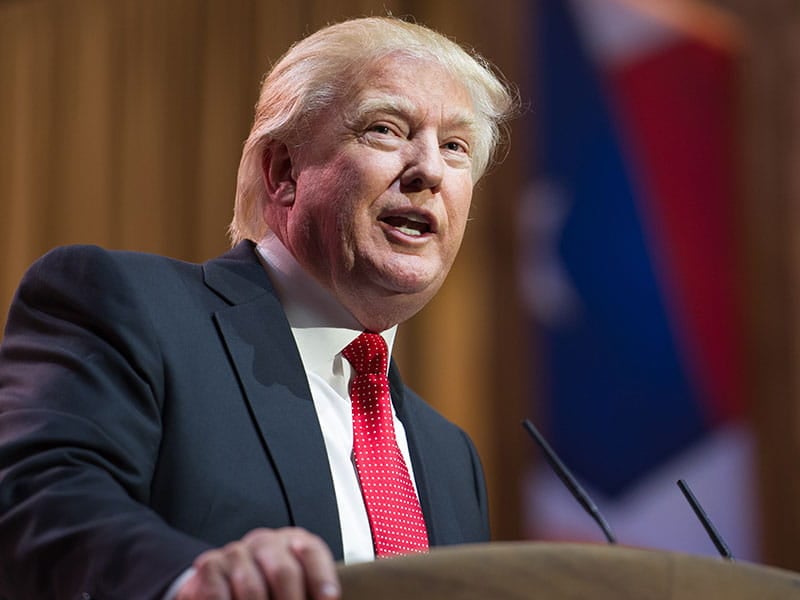
Before the election, Donald Trump was a growing phenomenon since entering the race for the GOP nomination in June 2015. The business guru resonated with people across the country, regardless of party affiliation, by voicing what many people are feeling about America’s future.
Trump courted the faith vote since 2012. He donated to several organizations such as the Billy Graham Evangelistic Association and Samaritan’s Purse. Trump further aligned himself with evangelicals when he spoke about ending the persecution of Christians overseas. Trump did seal up the Christian vote with 81 percent of evangelical voters supporting him in 2016. But not all agree with Trump's policies. Another group has been forming beneath the surface and it is not who you think. The religious left is growing and is very averse to the president and his policies regarding immigration, healthcare, the environment and on social issues.
There has always been a religious left Patrick Hornbeck II, chairman of the theology department at Fordham University explained to Reuters. "It's one of the dirty little secrets of American politics that there has been a religious left all along and it just hasn't done a good job of organizing. It has taken a crisis or perceived crisis, like Trump's election to cause folks on the religious left to really own their religion in the public square." Are we in a crisis?
Yes, we are according to people like Rev. Jim Wallis, the editor-in-chief of Sojourners magazine and the founder of the faith-based antipoverty organization Call to Renewal. He is not surprised that the religious left is gaining more ground in the politics. People are exercising their right to be heard. Yet, the price is being paid by the church, he warned. "He [Trump] turned legitimate economic resistance among white working class and rural constituencies into racial resentments, blaming immigrants, blaming a black president, when the source of their problems had been ignored by the left and the right and the elites of both sides," Wallis explained in an interview with the Christian Post. He added that white evangelicals who voted for Donald Trump and are responsible for him. "There has never been such a racial divide in the church in my lifetime than what I see now. Black evangelicals I know don't even want to speak to white evangelicals because they voted for Donald Trump." Wallis is not the only one leading the onslaught against Trump.
Leaders of Faith in Public Life is a group of progressive faith leaders. They played an important role in changing the narrative about the role of faith in politics and winning major progressive policy victories. Yet, they were not ready for the number of people who started to support them with their efforts. Interfaith leaders joined the organization to protest against Sen. Jeff Sessions (R-AL) for Attorney General in January. They believed that the president was misguided in his selection due to Sessions' record on racism and radical ideologies. The following month Trump was again greeted by protesters before the National Prayer Breakfast in Washington that was organized by the organization, Sojourners and Church World Service to end discrimination.
Protesters were disenchanted with cabinet nominees, plans to repeal the Affordable Care Act, the Muslim ban, but Trump's position over building a wall on the Mexico border. Over 800 people including Faith in Public Life, signed the letter. They urged Trump to use the White House as a vessel to unite, not as a wall of exclusion. Faith leaders supporting the movement demanded that people need to be compassionate, merciful and kind to the refugees and immigrants, unlike Trump's policies. “Jesus makes it very clear that whatever we do to the least of these we do to him—that includes welcoming the stranger,” Rev. Donna Sokol told ThinkProgress reporter Jack Jenkins at the National Prayer Breakfast. “When it comes to immigration and refugees, it’s a matter of faith." Activism for the religious left can be traced back to the Civil Rights movement of the 1960s when people of various religious beliefs protested to end violence, to end discrimination and to end hatred against African Americans. But why can't we get on the same page? Wallis said that the Republicans are more comfortable with the language of faith and values. However, they narrow it to one or two issues. "Democrats are less comfortable with the language. They often seem like they want to keep faith and values in the private sphere, but where would we be if Martin Luther King, Jr. kept his faith to himself?"
The religious left is finding a voice as more leaders and followers are taking more of an active role in social issues. They are not as powerful as the religious right but have increasingly become a force in American politics. What would be interesting to see is how politicians will manipulate the movement to make it work for their respective party's benefit.

